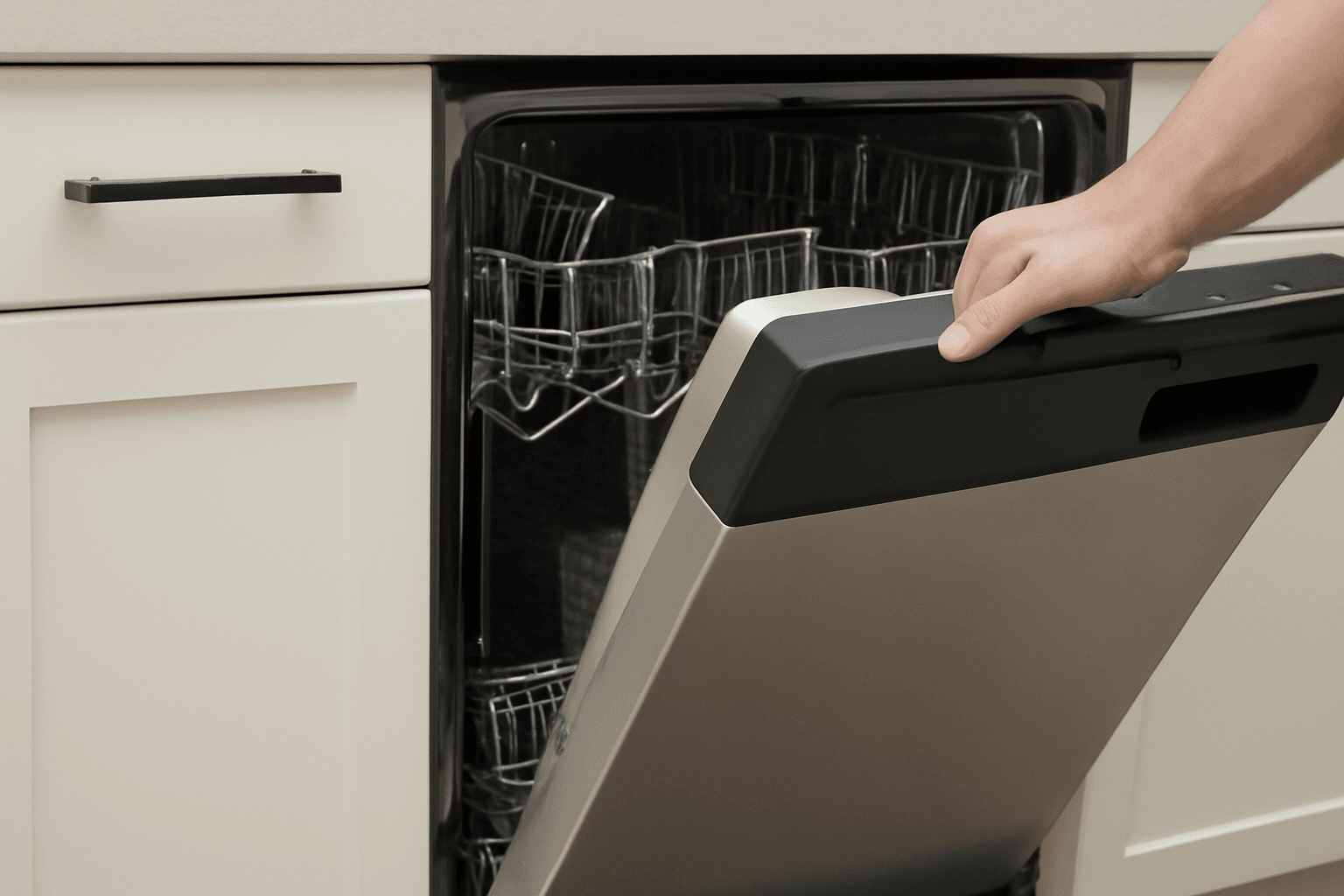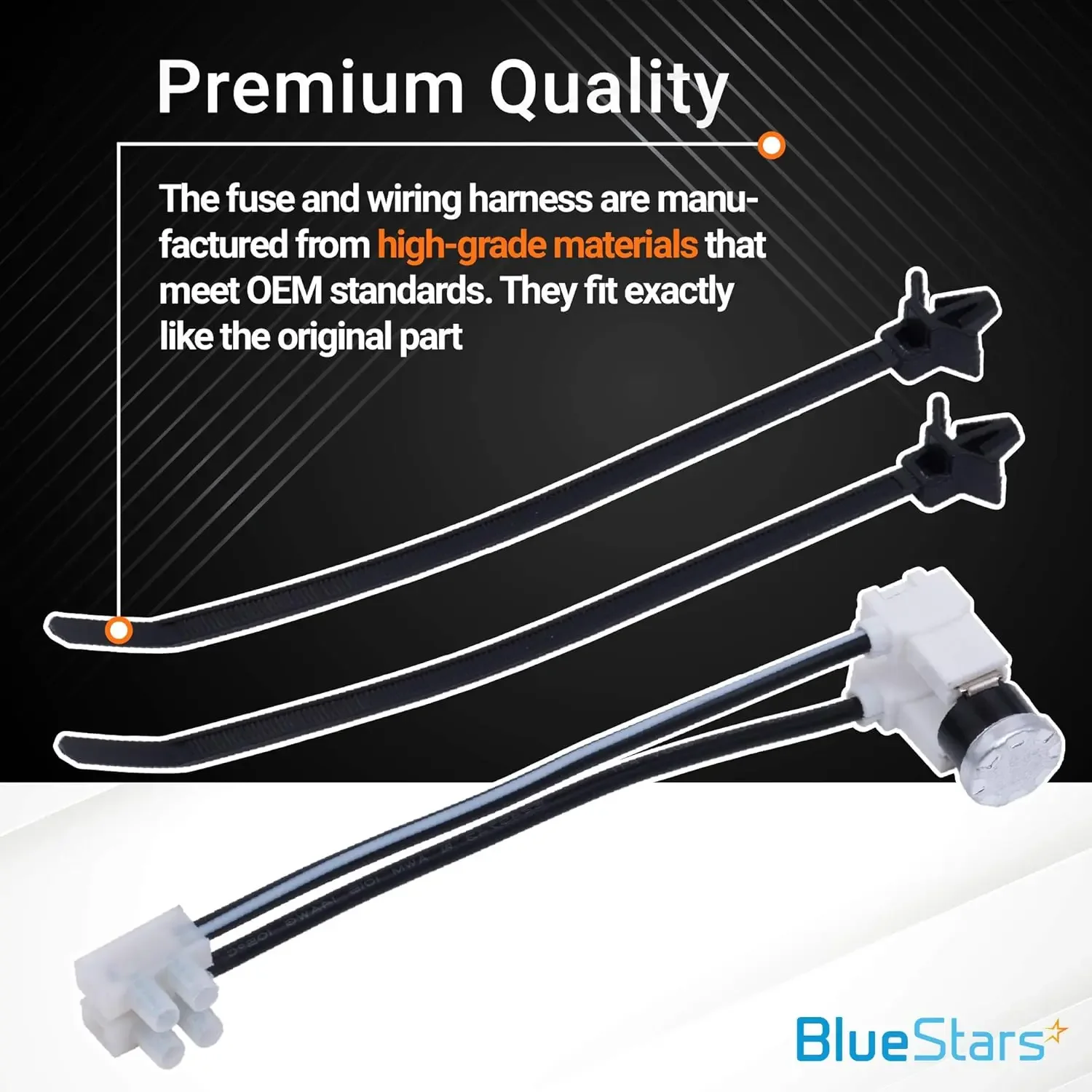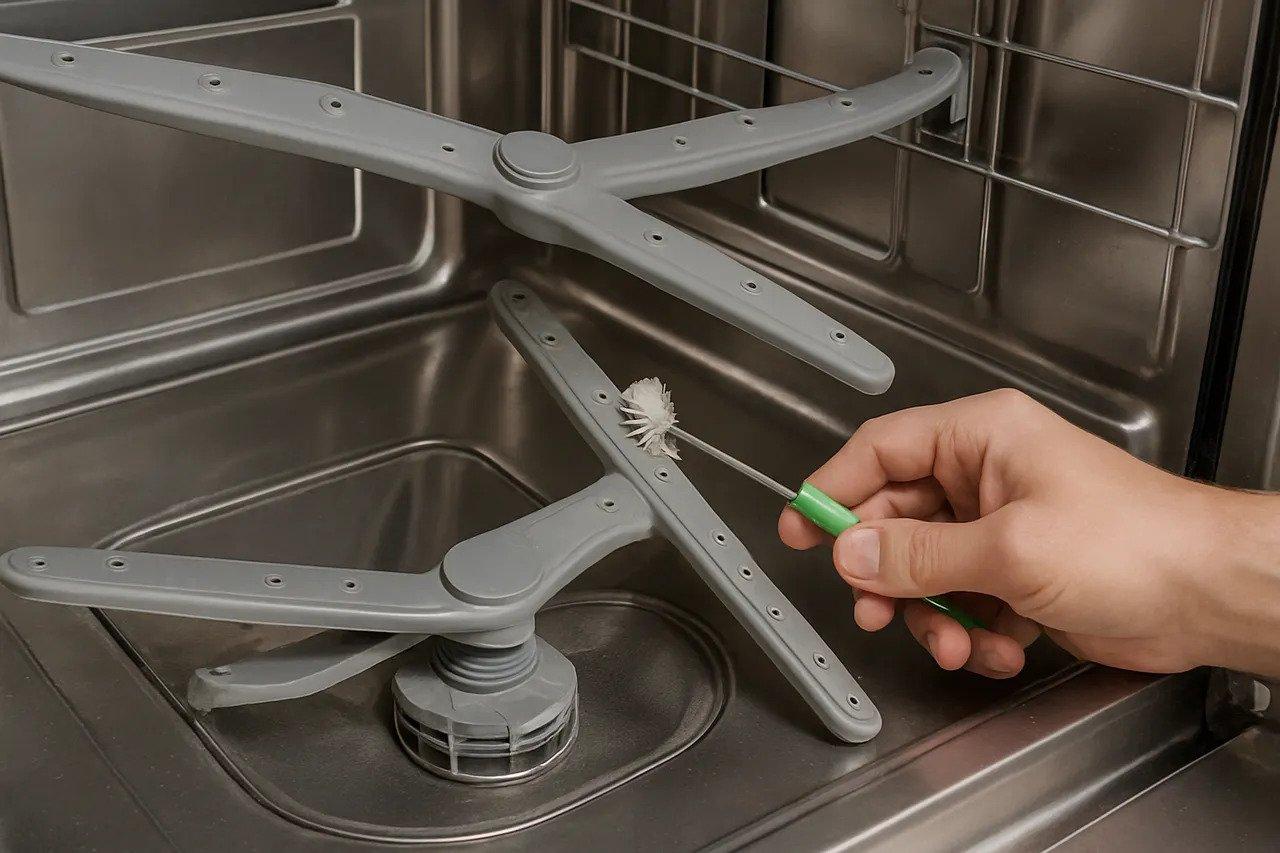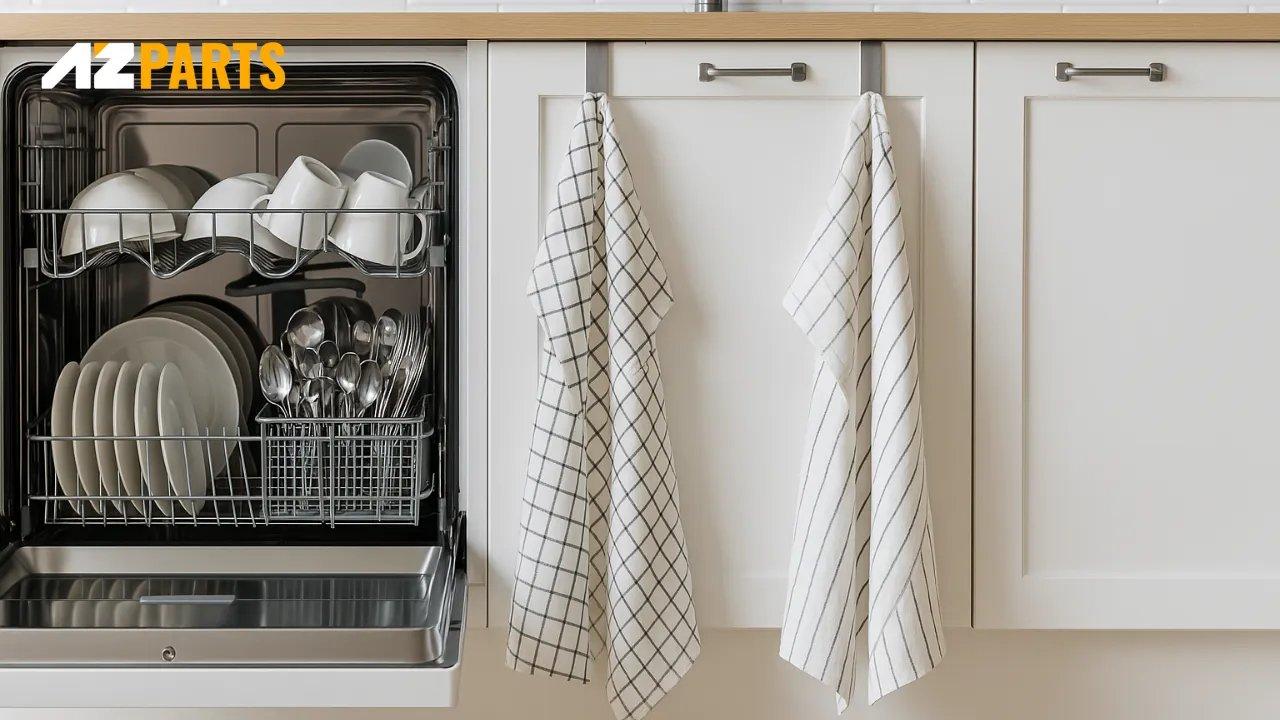How-To Guides
8 Common Whirlpool Dishwasher TroubleShooting and How to Fix
AZparts Team
Updated on December 17, 2025
9 min read
Whirlpool dishwashers are well-regarded for their durability and performance. However, like any household appliance, they can develop problems over time. You might start to notice that your dishes are not coming out clean, water is not draining properly, or strange noises are coming from the machine. While these issues can be annoying, many of them have simple solutions. In this article, AZParts will explore the most common Whirlpool dishwasher problems and show you how to fix them quickly and effectively.

1. Whirlpool Dishwasher Won’t Start
If your Whirlpool dishwasher won't start, it can be frustrating but there are a few simple troubleshooting steps to try before calling a technician.
- First, check if the control lock is activated. This safety feature prevents accidental button presses, but when enabled, it can make the dishwasher unresponsive. Refer to your manual to deactivate the control lock, usually by pressing and holding a specific button for a few seconds.
- Next, make sure the dishwasher isn’t in sleep mode. Try opening and closing the door, then pressing the Start or Resume button to see if it responds.
- If the dishwasher still won’t start, try resetting it by unplugging the appliance or turning off the circuit breaker for about one minute before powering it back on.
If none of these steps work, there could be an electrical or mechanical issue requiring professional repair.
2. Whirlpool Dishwasher Not Draining Properly
If your Whirlpool dishwasher won’t drain and you notice standing water pooling at the bottom of the tub, it’s usually a sign of a clog or blockage in the drainage system. While a small amount of water (about an inch) is normal after a cycle, anything more may indicate an issue that needs attention.
The first thing to check is the dishwasher filter. Over time, food particles, grease, and debris can clog the filter, preventing proper water drainage.
Here’s how to clean the filter:
- Locate the filter: Remove the bottom rack of your dishwasher to access the filter, typically found on the floor of the tub.
- Remove and clean: Twist or lift the filter out, depending on your model. Rinse it under warm, soapy water, using a soft brush to remove buildup.
- Reinstall the filter: Once the filter is clean and free of debris, place it back securely into position.
If cleaning the filter doesn’t resolve the troubleshooting, the problem may be with the drain hose; it could be kinked, clogged, or disconnected. In some cases, a blocked air gap or faulty drain pump could also be the culprit.
Check out more: How to Clean Properly Your Dishwasher Drain
-min_1752226625.png)
Whirlpool Dishwasher Water Not Draining Properly (Source: AZParts)
3. Dishes Come Out Dirty or Cloudy
If your dishes still look dirty or cloudy after a full dishwasher cycle, there are several common causes to consider.
- Improper loading is one of the main reasons, make sure dishes face downward and toward the spray arms, and avoid overcrowding, which can block water flow and lead to poor cleaning.
- Using too much detergent can also leave a filmy residue on your plates and glasses, especially if you have hard water. Follow the detergent package instructions carefully to avoid buildup.
- Selecting the wrong wash cycle may result in dishes not being cleaned thoroughly. For heavily soiled dishes, choose a heavy-duty cycle instead of a quick wash or rinse-only option to ensure better cleaning performance.
- Hard water deposits can also cause cloudy or spotted dishes. Using a rinse aid or installing a water softener can help reduce mineral buildup and improve cleaning results.
4. Whirlpool Dishwasher Is Leaking
If your Whirlpool dishwasher is leaking water, several factors could be causing the issue.
- One common cause is a worn or damaged door gasket (door seal). Over time, the gasket can develop cracks or gaps that allow water to escape during a wash cycle. Inspect the seal carefully, and if you notice any damage, consider a door gasket replacement。
- Using the wrong detergent can also lead to leaks. Avoid using regular dish soap or homemade detergents, as they can create excessive suds that overflow and cause water to leak onto your floor. Always use detergents specifically designed for dishwashers.
- Another frequent cause of leaks is overloading the dishwasher. When overloaded, the dishwasher may use more water than usual, increasing the chance of spills and leaks. Make sure to load your dishes according to the manufacturer’s instructions to ensure proper water flow and prevent leaks.
If you’ve checked these common causes and your dishwasher is still leaking, it’s recommended to contact a professional technician for a thorough inspection and repair.
-min_1752226652.png)
Whirlpool Dishwasher Water Leakage Issue (Source: AZParts)
5. Dishwasher Makes Strange Noises
If your Whirlpool dishwasher is making unusual noises, the cause often lies in a few key areas.
- Debris caught in the pump or spray arms can create grinding or rattling sounds as the machine runs. To fix this, start by removing and thoroughly cleaning the filters and spray arms. Check inside the dishwasher tub for any foreign objects like small bones or broken glass that might be causing the noise, and remove them carefully.
- Sometimes, a grinding noise indicates a worn or damaged motor or drain pump. If cleaning doesn’t help and the noise persists, inspect these components. A faulty pump or motor may need to be replaced. While you can buy replacement parts to perform the fix yourself, professional assistance is recommended if you’re unfamiliar with appliance repairs.
- If the dishwasher is humming but not starting, this usually means the motor is struggling to run, often due to electrical issues or a jammed pump. Try resetting the dishwasher by unplugging it or switching off the power for a minute.
By addressing these causes step-by-step, you can often identify and resolve strange dishwasher noises before they lead to bigger problems.
Check out more: Dishwasher Making Buzzing Noise
-min_1752226987.png)
Dishwasher Noisy with Odd Sounds (Source: AZParts)
6. Whirlpool Dishwasher Doesn’t Fill with Water
If your Whirlpool dishwasher is not filling with water, the most common cause is a faulty or clogged water inlet valve. This valve controls water flow into the dishwasher, so if it’s blocked or broken, water won’t enter properly. You can try cleaning or replacing the valve yourself if comfortable, or call a professional for help.
Also, check that the water supply is turned on and the hose isn’t kinked or frozen. Low water pressure can cause filling issues too.
If these steps don’t work, there may be a problem with the dishwasher’s controls or float switch, which will need a technician’s attention.
7. Whirlpool Dishwasher Smells Bad
A smelly dishwasher is often caused by trapped food particles and buildup inside the appliance. To remove unpleasant odors, start by cleaning the dishwasher filter thoroughly, remove it and rinse away any debris.
Next, run an empty wash cycle using a dishwasher cleaner designed to eliminate odors and break down residue. Products like afresh tablets work well for this purpose.
To keep your dishwasher smelling fresh, maintain a regular cleaning routine by checking and cleaning the filter and interior as recommended in your product manual. Consistent maintenance helps prevent odor buildup and keeps your dishwasher running efficiently.
-min_1752227091.png)
Whirlpool Dishwasher Emits Bad Odors (Source: AZParts)
8. Dishwasher Door Won’t Latch or Open
If your Whirlpool dishwasher door is not closing properly or won’t latch, it can prevent the machine from starting or cause leaks. This issue is often due to a faulty latch mechanism or a misaligned door.
To fix this, first check if anything is blocking the door from closing fully, such as oversized dishes or utensils. If the door still won’t latch, inspect the latch for damage or wear. Sometimes, the latch or strike plate may need tightening or replacement.
If your dishwasher door won’t open after a cycle, it might be stuck due to a faulty latch or door lock mechanism. Avoid forcing it open to prevent damage; instead, unplug the dishwasher and wait a few minutes before trying again. If problems persist, contacting a professional technician is recommended.
-min_1752227133.png)
Dishwasher Door Fails to Close or Open Properly (Source: AZParts)
9. Recommended Replacement Parts for Common Whirlpool Dishwasher Issues
When repairing your Whirlpool dishwasher, having the right replacement parts can make all the difference. Commonly needed parts include:
- Dishwasher Rack Parts
- Dishwasher Door, Seal Parts
- Dishwasher Detergent System Parts
- Dishwasher Filter, Basket Parts

Thermal Fuse at AZParts with High Quality (Source: AZParts)
Purchasing genuine or high-quality parts ensures durability and compatibility with your model. Always check your dishwasher’s manual or model number before ordering to get the correct components.
For reliable replacement parts, AZParts offers a wide selection of genuine and compatible Whirlpool dishwasher parts. With fast shipping and excellent customer service, AZParts makes it easy to find the right components to get your dishwasher running smoothly again.
11. Frequently Asked Questions (FAQs)
11.1. Why is my dishwasher not starting but has power?
This could be caused by a few issues, such as the control lock being activated, the dishwasher door not closing properly, or a faulty start button. Try unlocking the control panel, ensuring the door is securely latched, and resetting the dishwasher by unplugging it for a minute. If it still won’t start, there may be an internal electrical or control board problem needing professional help.
11.2. What’s the lifespan of a typical dishwasher?
Most dishwashers last between 8 to 12 years with proper care. Regular maintenance, timely repairs, and avoiding overloading can help extend your dishwasher’s lifespan.
11.3. Can I fix a dishwasher leak myself?
Minor leaks caused by worn door seals or loose connections can often be fixed by cleaning or replacing parts yourself. However, leaks from damaged hoses, pumps, or internal components may require a professional technician to avoid further damage.
11.4. How often should I clean the dishwasher filter?
It’s best to clean the dishwasher filter at least once a month to prevent clogs and ensure efficient drainage and cleaning performance.
11.5. Is it worth repairing an old dishwasher?
If your dishwasher is over 10 years old and requires costly repairs, it might be more economical to replace it with a newer, more energy-efficient model. For relatively minor repairs on newer machines, fixing the dishwasher is usually worthwhile.
11.6. Why is there standing water in my whirlpool dishwasher?
A small amount of standing water in a Whirlpool dishwasher is normal and helps protect the pump and seals. However, if there is too much water, or it is dirty or smells, it is usually caused by a clogged filter, blocked or kinked drain hose, a disposal plug not removed, or a drain pump problem.
For unusual noises, leaks, or performance issues you can’t resolve on your own, seek professional help before it worsens. With proper care and quality Whirlpool parts, your dishwasher will stay in top condition and keep your dishes sparkling clean.
Contact Info
Address: 8 The Green, Ste A, Dover, Delaware 19901-3618, United States
Email: support@azparts.com
Dishwasher
- 1. Whirlpool Dishwasher Won’t Start
- 2. Whirlpool Dishwasher Not Draining Properly
- 3. Dishes Come Out Dirty or Cloudy
- 4. Whirlpool Dishwasher Is Leaking
- 5. Dishwasher Makes Strange Noises
- 6. Whirlpool Dishwasher Doesn’t Fill with Water
- 7. Whirlpool Dishwasher Smells Bad
- 8. Dishwasher Door Won’t Latch or Open
- 9. Recommended Replacement Parts for Common Whirlpool Dishwasher Issues
- 11. Frequently Asked Questions (FAQs)
- 11.1. Why is my dishwasher not starting but has power?
- 11.2. What’s the lifespan of a typical dishwasher?
- 11.3. Can I fix a dishwasher leak myself?
- 11.4. How often should I clean the dishwasher filter?
- 11.5. Is it worth repairing an old dishwasher?
- 11.6. Why is there standing water in my whirlpool dishwasher?
Further Reading
Further Reading



_1748246700.jpg&w=3840&q=75)

